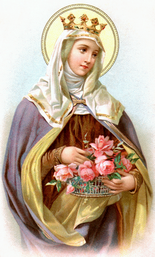 Happy feast of St. Elizabeth of Hungary! She inspires us to help the poor. Even from a young age she was thinking about and helping the less fortunate.
Happy feast of St. Elizabeth of Hungary! She inspires us to help the poor. Even from a young age she was thinking about and helping the less fortunate.
As a daughter of royalty, Elizabeth was thrust into many responsibilities as well as her future marriage which had been arranged by her father. This arrangement caused her to be separated from her family at a very young age.
Elizabeth lived up to her duties, as well as took care of the countless needy people who came to her gate for bread. In serving the afflicted, there were times Elizabeth gave away the royal clothes and goods.
Perhaps my very favorite story about St. Elizabeth was when she allowed a sick leper to sleep in her bed when her husband was away. Her husband Ludwig returned unexpectedly and his mother, who always found fault with Elizabeth, summoned Ludwig to see who was in his bed. Upon throwing back the blankets, Elizabeth’s husband did not see a leper but miraculously saw Jesus lying there.
Constantly caring for the severely ill, Elizabeth became deathly ill and died at the young age of almost twenty four. Miraculous healings soon began to occur at her grave located near the hospital she founded. Elizabeth was canonized only four years later.
St. Elizabeth is the patron saint of Secular Franciscans and Catholic Charities.
Pope Benedict XVI spoke about her:
Elizabeth practiced assiduously the works of mercy: she gave to drink and eat those who came to her door, she got clothes, paid debts, looked after the sick and buried the dead. Coming down from her castle, she often went with her maidservants to the homes of the poor, taking bread, meat, flour and other foods. She would hand the food out personally and carefully oversaw clothes and shelter for the poor. This behavior was reported to her husband, who not only was not annoyed, but answered her accusers: “So long as they don’t come to the castle, I’m happy!” Placed in this context is the miracle of bread transformed into roses: While Elizabeth was going through the street with her apron full of bread for the poor, she met her husband, who asked her what she was carrying. She opened her apron and, instead of bread, magnificent roses appeared. This symbol of charity is often present in depictions of St. Elizabeth.
Hers was a profoundly happy marriage: Elizabeth helped her husband to raise his human qualities to the supernatural level and he, on the other hand, protected his wife in her generosity to the poor and in her religious practices. Ever more in admiration of his wife’s great faith, Ludwig, referring to her care of the poor, said to her: “Dear Elizabeth, it is Christ whom you have washed, fed and looked after.” A clear testimony of how faith and love of God and one’s neighbor reinforce marital union and make it even more profound…”
~ Pope Benedict XVI, Oct. 20, 2010.
Conrad of Marburg, St. Elizabeth’s spiritual adviser, wrote a letter in support of her canonization:
“Elizabeth was a lifelong friend of the poor and gave herself entirely to relieving the hungry. She ordered that one of her castles should be converted into a hospital in which she gathered many of the weak and feeble. She generously gave alms to all who were in need, not only in that place but in all the territories of her husband’s empire. She spent all her own revenue from her husband’s four principalities, and finally she sold her luxurious possessions and rich clothes for the sake of the poor.
“Twice a day, in the morning and in the evening, Elizabeth went to visit the sick. She personally cared for those who were particularly repulsive; to some she gave food, to others clothing; some she carried on her own shoulders, and performed many other kindly services. Her husband, of happy memory, gladly approved of these charitable works. Finally, when her husband died, she sought the highest perfection; filled with tears, she implored me to let her beg for alms from door to door. Good Friday of that year, when the altars had been stripped, she laid her hands on the altar in a chapel in her own town, where she had established the Friars Minor, and before witnesses, she voluntarily renounced all worldly display and everything that our Savior in the Gospel advises us to abandon. Even then, she saw that she could still be distracted by the cares and worldly glory which had surrounded her while her husband was alive. Against my will, she followed me to Marburg. Here in the town, she built a hospice where she gathered together the weak and the feeble. There she attended the most wretched and contemptible at her own table.
Apart from those active good works, I declare before God that I have seldom seen a more contemplative woman.”
Pray for us and teach us to love the poor, St. Elizabeth! As your husband realized and exclaimed, “Dear Elizabeth, it is Christ whom you have washed, fed and looked after,” pray for us that we will strive to care for the poor too. Amen.





